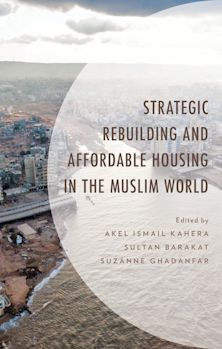- Home
- ACADEMIC
- Architecture
- Urban Design and Planning
- Urban Renewal and Resistance
Urban Renewal and Resistance
Race, Space, and the City in the Late Twentieth to the Early Twenty-First Century
Urban Renewal and Resistance
Race, Space, and the City in the Late Twentieth to the Early Twenty-First Century
You must sign in to add this item to your wishlist. Please sign in or create an account
Description
Urban Renewal and Resistance: Race, Space, and the City in the Late Twentieth to Early Twenty-First Century examines how urban spaces are rhetorically constructed through discourses that variously justify or resist processes of urban growth and renewal. This book combines insights from critical geography, urban studies, and communication to explore how urban spaces, like Detroit and Harlem, are rhetorically structured through neoliberal discourses that mask the racialized nature of housing and health in American cities. The analysis focuses on city planning documents, web sites, media accounts, and draws on insights from personal interviews in order to pull together a story of city growth and its consequences, while keeping an eye on the ways city residents continue to confront and resist control over their communities through counter-narratives that challenge geographies of injustice. Recommended for scholars of communication studies, journalism, sociology, geography, and political science.
Table of Contents
Part I: Race and Displacement in Detroit
Chapter 2: Narratives of Growth and Collective Resistance
Chapter 3: Rationality vs. Demystification
Part II: Race and Health in Harlem
Chapter 4: Mapping Race
Chapter 5: Citizen Science: How We Come To Know What We Know
Chapter 6: Neoliberalism, Urban spaces, and Race
Product details
| Published | Aug 26 2016 |
|---|---|
| Format | Ebook (Epub & Mobi) |
| Edition | 1st |
| Extent | 202 |
| ISBN | 9780739193822 |
| Imprint | Lexington Books |
| Illustrations | 7 BW Illustrations, 4 BW Photos |
| Publisher | Bloomsbury Publishing |
About the contributors
Reviews
-
A robust, rigorous, and critical critique of the often unexamined impact of the ‘colorblind neoliberal paradigm’ in U.S. urban renewal programs. Useful for understanding urban space, race, and the Black Lives Matter movement.
Gene Burd, Founding Benefactor, Urban Communication Foundation
-
In Urban Renewal and Resistance, Mary E. Triece foregrounds and carefully analyzes the voices, rhetorics, and experiences of those marginalized by America’s racially oppressive and exclusionary urban landscapes. She shows how African American urban residents suffering through gentrification-driven displacement in post-bankruptcy Detroit and enduring toxic exposure in contemporary Harlem are organizing, speaking out, and fighting back. As such, this book makes a vital contribution to our understanding of the discursive dimension of the struggles surrounding the racial and class inequalities that define the neoliberal city.
Steve Macek, North Central College


































